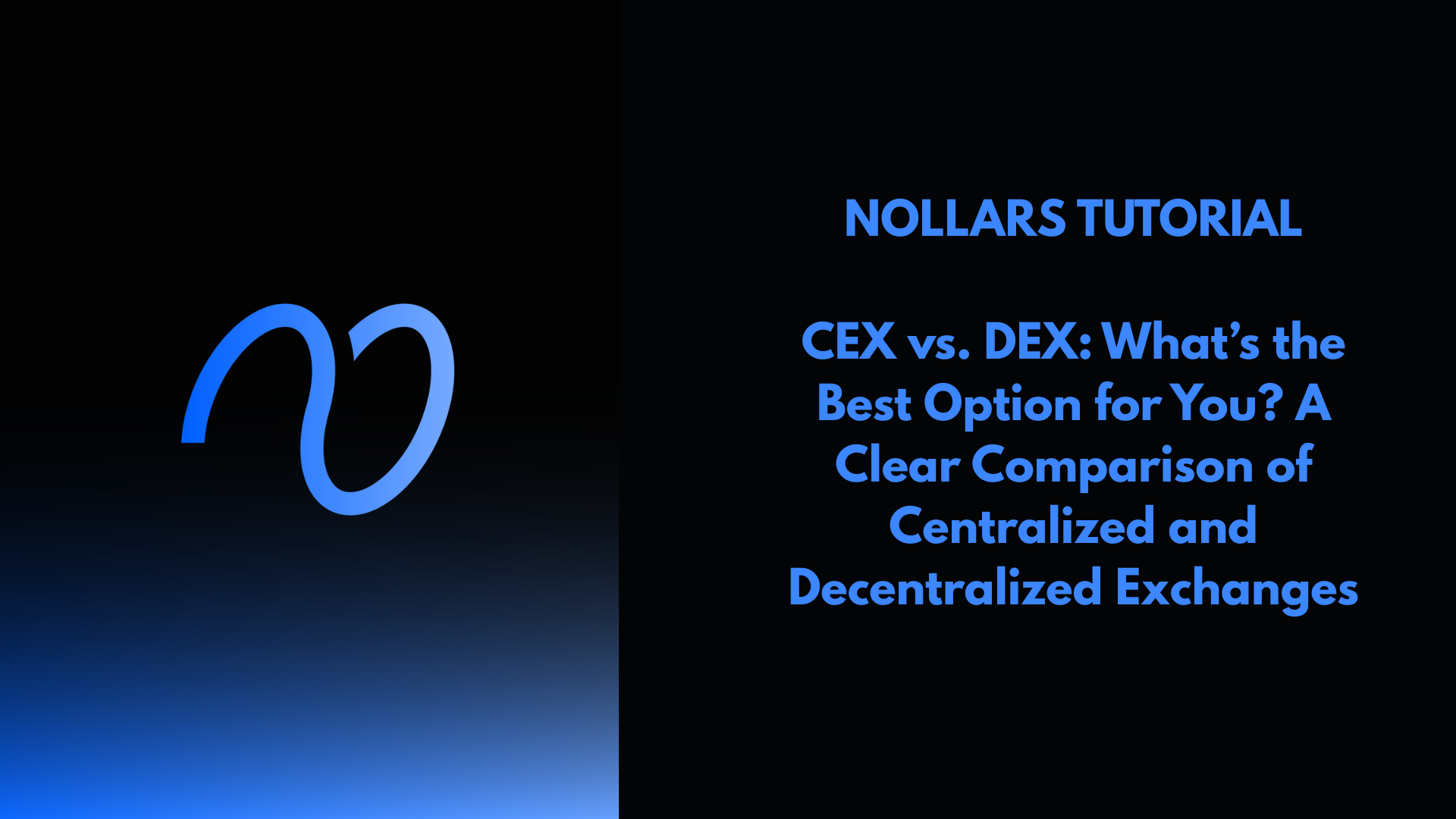Picking between a centralized exchange (CEX) and a decentralized exchange (DEX) really comes down to what matters most to you as a trader.
CEXs are usually better for beginners because they offer easier use, faster transactions, and higher liquidity.
But DEXs? They give you more control over your funds and a lot more privacy, so if you’re not into handing your assets over to some middleman, they might be your thing.

CEXs handle fiat currencies and toss in more trading features, but you’ve got to trust them with your money.
DEXs, meanwhile, let you trade straight from your wallet—no central authority involved.
You might face higher fees or slower processing on DEXs, though.
If you want to dig deeper into the pros and cons of each, there are plenty of resources out there to help you make sense of it all.
Understanding Centralized Exchanges (CEX)
Centralized exchanges are basically the middlemen for crypto trading.
They hold your funds and take care of processing transactions.
You rely on them for buying, selling, and storing assets—ideally in a secure, efficient way.
How CEXs Operate
CEXs control your account and wallet.
When you buy or sell, the exchange handles the trade internally, almost like a bank.
They keep your funds and update your balance until you decide to withdraw or transfer.
To use a CEX, you’ll need to make an account and pass some identity checks.
That’s how they stay on the right side of regulations.
You’ll usually find user-friendly interfaces and quick trade execution.
They manage liquidity behind the scenes to keep trading smooth.
Advantages of Using a CEX
Convenience is a big win here.
Centralized platforms are easy for beginners, with straightforward tools and customer support.
Big trading volumes usually mean better prices and more liquidity.
CEXs give you features like margin trading, advanced order types, and quick deposit or withdrawal options.
Most support a wide selection of cryptocurrencies, so you can diversify pretty easily.
Limitations and Security Concerns
But there’s a catch: CEXs hold your private keys and funds, so you have to trust their security.
This setup makes them pretty juicy targets for hackers.
There have been some high-profile hacks where users lost money.
You also have to deal with strict regulations and identity checks, so privacy takes a hit.
If the exchange goes down, delays withdrawals, or even goes bankrupt, your assets could be at risk.
You’re stuck with whatever policies the platform has for keeping your money safe.
Want more on these differences? Check out centralized and decentralized crypto exchanges.
Exploring Decentralized Exchanges (DEX)
Decentralized exchanges ditch the middleman entirely, letting you control your funds directly.
They put security, privacy, and transparency first, but you might have to wrestle with clunky interfaces or low liquidity.
Core Principles of DEXs
DEXs use blockchain tech and smart contracts so trades happen peer-to-peer.
There’s no company holding your coins or controlling your trades.
If you have a compatible wallet, you can trade on a DEX—no ID or paperwork required.
They run on open-source code, so anyone can poke around and check for issues.
This helps build trust and transparency.
DEXs let anyone in—no permissions needed, no gatekeepers.
Key Benefits for Users
You always keep your private keys and funds.
That means you’re less likely to lose crypto to a hack on some central platform.
Privacy’s a lot better, too—no KYC, no handing over your info.
DEXs also let you access more tokens, especially the weird or new ones you won’t find on big exchanges.
Trades can be quick with automated market makers, so you don’t have to wait for an order book to match up.
Challenges and Risks
DEXs don’t always have deep liquidity, so big trades can move prices or just be tough to pull off.
Their interfaces can be confusing, especially if you’re new.
Smart contracts can have bugs, and if something goes wrong, there’s no one to call.
You’ll also pay blockchain transaction fees, and those can spike when the network’s busy.
Curious about DEX features and security? Polkadot’s DEX guide is a solid place to start.
CEX vs. DEX: Key Comparison Factors
When you’re weighing CEX vs. DEX, think about what matters: security, ease of use, fees, liquidity.
Both types have their perks and downsides, and they shape your trading experience.
Security and Control
CEXs hold your crypto in their wallets, so you’re trusting their security.
If they get hacked or mismanage funds, you could lose out.
Some CEXs have strong security teams and even insurance, but the risk is still there.
DEXs let you keep your private keys, so hacks on the platform itself won’t drain your wallet.
But you’re on your own for security—lose your keys, and there’s no getting them back.
It’s more responsibility, but you’re in the driver’s seat.
User Experience and Accessibility
CEXs are generally easier to use.
They’ve got clear interfaces, customer support, and it’s simple to deposit or withdraw fiat.
If you’re new or just want quick, simple trades, CEXs are probably your best bet.
DEXs can be intimidating.
You’ll need to connect a wallet and deal with blockchain fees.
There’s no customer support, but you get privacy and don’t have to share your identity.
That’s a big plus for some folks, especially if you’re more experienced.
Trading Fees and Costs
Centralized exchanges usually charge fixed trading fees, and sometimes withdrawal fees.
They might be a bit higher, but you get faster trades and more features.
DEXs use automated market makers, so fees are built into trades and can fluctuate with network congestion.
You’ll also pay blockchain transaction fees, which can get pricey during busy periods.
Liquidity and Market Depth
Liquidity is all about how easily you can buy or sell without moving the price too much.
CEXs typically have higher liquidity thanks to lots of buyers and sellers.
That makes big trades easier and faster.
DEXs, on the other hand, can struggle with liquidity.
Some tokens might not be available, and price swings can be bigger.
If you’re after rare or brand-new tokens, though, DEXs can be the only place to find them.
But be ready for slower trades and more volatility.
| Factor | CEX | DEX |
|---|---|---|
| Security | Exchange controls assets; risk if hacked | User controls keys; secure but requires personal care |
| User Experience | Easy for beginners; support available | Complex; no support; privacy-focused |
| Fees | Fixed fees; potentially higher | Variable fees; plus blockchain costs |
| Liquidity | Higher liquidity; faster trades | Lower liquidity; price volatility |
Choosing the Best Option for Your Needs
Picking between a CEX and a DEX really depends on what you need—ease of use, security, control.
You’ll also want to think about how much support or privacy you expect.
Identifying Your Priorities
If you want something simple, fast, and with customer support, CEXs are hard to beat.
They’re usually easy to use, have high liquidity, and let you work with fiat currencies.
But you’ll have to go through KYC and give up some control over your assets.
If privacy and security are your top concerns, DEXs are more appealing.
You can trade directly from your wallet, no registration or personal info required.
You get more control, but things might be a bit clunkier and liquidity can be lower.
| Priority | Best Option |
|---|---|
| Ease of use | Centralized Exchange |
| Customer support | Centralized Exchange |
| Privacy and control | Decentralized Exchange |
| High liquidity | Centralized Exchange |
| Avoiding KYC | Decentralized Exchange |
Hybrid Solutions and Future Trends
Some platforms are starting to blend features from both CEXs and DEXs.
These hybrid exchanges aim for the best of both worlds—user-friendly design with less reliance on central control.
You might see things like quick trades, better privacy, or even partial custody options.
Crypto trading’s future could be all about these hybrid models and new decentralized tech.
Layer-two solutions and better wallets might make DEXs faster and easier.
Keep an eye out for exchanges that manage to balance security, speed, and usability as things keep evolving.
If you want a mix of benefits, hybrids could be worth a look.
They might solve some of the headaches you get with pure CEX or DEX platforms.
For more on these trends, check out CEX vs DEX.
Frequently Asked Questions
Centralized and decentralized exchanges go about things differently.
They vary in fees, security, and how much control you have.
What are the main differences between centralized (CEX) and decentralized (DEX) exchanges?
Centralized exchanges (CEXs) are run by companies that hold your funds and handle the order matching.
You’ve got to trust them with your assets.
Decentralized exchanges (DEXs) don’t have a central authority.
You trade directly from your wallet, so you keep control of your funds.
Can you provide some notable examples of centralized and decentralized crypto exchanges?
Some of the big CEX names are Binance, Coinbase, and Kraken.
They’ve got huge user bases and lots of trading pairs.
For DEXs, think Uniswap, SushiSwap, and PancakeSwap.
These platforms run on blockchains and let you trade without a middleman.
What are the specific advantages and disadvantages of using a DEX compared to a CEX?
DEXs give you better privacy and security since you hold your keys.
You’ll often see lower fees and can skip the KYC process.
But DEXs can be a pain with lower liquidity and slower trades.
Their interfaces aren’t always friendly for newbies.
CEXs offer fast trades, deep liquidity, and more tools for beginners.
Still, you have to trust them with your assets, and they’re targets for hacks.
Why might traders choose a decentralized exchange over a centralized one?
Some traders go for DEXs to keep their privacy and avoid giving up control of their crypto.
DEXs also open the door to a wider range of tokens—not everything gets listed on a CEX.
If you’re looking to earn more by providing liquidity, DEXs support those DeFi features too.
How do centralized and decentralized exchanges handle security and user privacy?
CEXs hold your funds in their own wallets. If someone hacks the platform, your assets could be at risk.
They also ask for identity verification, so you end up giving up some privacy.
DEXs work differently. You trade straight from your own wallet, which feels a bit safer since there’s no big central pot for hackers to target.
Plus, DEXs don’t usually demand your personal details, so you get to keep a lot more privacy.
Are there emerging trends or technologies that blend the features of CEX and DEX platforms?
Developers are rolling out hybrid exchanges that try to merge the liquidity and user-friendly vibe of CEXs with the privacy and security perks of DEXs.
Layer 2 solutions and cross-chain trading tech are also in the works. They’re supposed to speed things up, cut down on fees, and give users more control—at least, that’s the idea.
For more details on differences and features, check out Token Metrics’ guide on DEX vs CEX.




